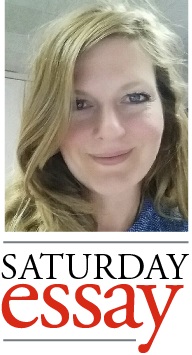The Inheritance
 My grandmother Irene was a pitiful, crazy person. Not all the time, unfortunately, or she’d have been packed into some coarse New England institution for experiments with electrons and lithium derivatives much earlier. As it was, because she alternated her violent and impulsive behavior with periods of serenity and excellent baking, she was allowed to quietly produce one, two, three, four and finally five wards of the state, one right after the other, before she was wrangled by the authorities and medicated to death.
My grandmother Irene was a pitiful, crazy person. Not all the time, unfortunately, or she’d have been packed into some coarse New England institution for experiments with electrons and lithium derivatives much earlier. As it was, because she alternated her violent and impulsive behavior with periods of serenity and excellent baking, she was allowed to quietly produce one, two, three, four and finally five wards of the state, one right after the other, before she was wrangled by the authorities and medicated to death.
Her youngest boy, Fred, who she kept along with three more kids, believed that shock therapy, medication, and age had actually healed Irene just enough that she could think rationally about what she’d done. So she overdosed herself on lithium.
We met her once, about a year before she died. She looked like a watercolor version of our mother, all smeared and indistinct in comparison. We had no idea she was our grandmother. Our mother introduced her as “Irene,” no more information.
She kept touching our hair with shaking, blue-veined hands.
My mother was her firstborn. Her father was a navy sailor, and at 17 too young to have any idea what was going on with his pregnant girlfriend of a few months, let alone understand what gripped her every six to eight weeks and forced her down to the bar, gone for days with other men. Naturally, he left her. My mother was born some six months later, only to wither in a wicker laundry basket until Irene, tormented by her inability to take care of my mother, called my great-grandmother Nora and announced that she had a live grandchild, a baby girl, who could be found at St. Elizabeth’s orphanage in Lewiston, Maine, if she was interested. Her name was Helen.
Nora was in a tight spot. Her husband Carl wanted nothing to do with another child, having successfully driven his 17-year-old son away at last into the military so he could more vigorously abuse his wife. He’d be damned if he was going to pay for some whore’s kid to come begging at his supper table, especially since he couldn’t even be sure the baby was his own flesh and blood. Shit, he wasn’t even 100 percent sure his own son was his. He saw the way Nora eyed the men at the bank and he’d wager she spent some time thinking about what was inside those inseams she measured at the tailor’s shop where she worked. That was why he had written her and his son out of his will, and never had a lick of life insurance. He’d be gawdammed if he was going to pay his wife to live high on the hog after he was dead, feeding her suitors with the fat back from all his hard work. Naw. When he was dead, so was she, as far as he was concerned. That’s what “until death do us part” meant to Carl. He was a terrible man.
Nora worked extra hours at the tailor shop to send my mother clothes at the orphanage, and took the bus up to Lewiston every weekend she could to see her.
My mother lived the first five years of her life in St. Elizabeth’s orphanage. She has never said even one word about it, save the name of the place itself. My sisters and I haven’t asked about it, and we probably never will.
When my mother first turned five, the laws of adoption changed. There were so many orphans that the government had started a program in which blood family could get a small stipend for adopting a child over the age of five. Nora explained to Carl that there was good money in it for them if they took her home, more than Nora made at the shop. Carl warmed to the idea, agreeing finally when he found out that Nora would also continue working, which meant that between her wages and the stipend from the state, he could retire a little early. Six months later, my mother was adopted legally by her grandmother.
Nora drove to the Lewiston orphanage in the Buick, something Carl usually forbid her to do. It was a golden late summer day, and the sky was as close and dense with color as the flesh of a fruit. The whole world was humming and alive, and you could hear the electrical buzzing of insects even with the car window up and the radio on. My mother was dressed in the little white pinafore seersucker dress Nora had sent the month before. She had a straw hat with a blue bow that she wore for special occasions, like Easter service or for the visits of prospective adoptive parents. She stood, erect and with her small wooden suitcase clutched in both hands, on the porch of St. Elizabeth’s as Nora drew the Buick up the drive.
There weren’t many papers to sign at all; Nora later would remark that it was much harder to buy that Buick. My mother sat next to the passenger side window, in the front with Nora on the bench seat, as they made the two-hour drive back to Massachusetts. My mother didn’t say much, but she never did, so they rode in a sort of warm, familiar quiet. As they drove, Nora told my mother all about the new school she’d attend in West Upton, about the parks and the playgrounds and the ice cream parlor. She told her about the tailor shop where she worked, and how one whole side of the room was just ladies’ dresses and wraps. She told her about Boston, and the zoo where you could see a live zebra and where there was a kind of candy that looked like old ladies’ hair.
They passed through the cities, passed the row houses and the smokestacks whose pulpy exhalations sooted the eaves and corners of windows, like eyeliner on silent movie stars. They passed the ocean inlets teeming with dead fish, stranded by the tides, rotting in such numbers that the city laid lye over their corpses so the townspeople didn’t have to evacuate, the smell was so bad. They passed acres of geometric farms, parallelograms of alternating shades of green, rust, and wheat, dotted with tiny red houses. On the side of the road at the stop sign of the four corners highway divide, a woman stood behind a massive apple stand, towering with enormous, shining apples. My mother involuntarily gasped. She had never seen that many apples in one place in her life.
Nora examined her granddaughter. “Would you like an apple, Helen?” She asked. My mother froze, incapable of processing the inquiry. A whole apple? A person could just stop and get a whole apple? Just like that? Her small head began to whirl, full of zebras and old women with candy hair and farms that grew row after row of tiny white dresses and apples, apples, apples … she started to shake a little, and cry. She was so ashamed she covered her face with her hat until she could stop herself.
Nora got out of the car and bought two apples from the women behind the cart, carefully selecting apples with no bruises, firm and tight to the touch. She climbed back into the Buick and set my mother’s apple on her lap. She bit into her own apple with a juicy crunch, and said, around a wet mouthful of fruit, “that one’s all yours, Helen.” She regarded her for a long while. “We’re gonna have so much fun, you and me.”
My mother held the apple in her hands, as carefully and gently as if she was holding a sleeping dove, all the way back to West Upton. It was dark when they got in. Carl was passed out in the recliner, and Nora shushed my mother right past him and into the den, beyond which was the bathroom, and the room her son used to have, which she had made up all in buttercup yellow and organza for my mother. She set her wooden case on the chair under the window, and told her she could stay up as long as she liked, getting situated and exploring her room. She clicked on a little wall lamp whose lampshade was a tiny, pirouetting ballerina, kissed her granddaughter on her head, and gently closed the door.
My mother moved her suitcase from the chair, and carefully removed its contents. She put her clothes into the dresser with the big sloping drawers, and her hat on the vanity’s elaborate iron swirls. Then she clicked off the light, and sat down next to the window until her eyes had acclimated themselves to the thickness of this new dark — the dark of a quiet neighborhood, of the lined and insulated walls of a home. She listened for the distant static of a fan, and the creak of wood, crickets, and trees. She held her apple up to her lips at last, and ate it. She even ate the stem and seeds, licking her palms as she went. She ate every bit. It was the most delicious thing she had ever tasted in her whole life.
Recommended Links:
Leave a Comment
Only registered members can post a comment , Login / Register Here














5 Comments
Godsey
about 9 years agopellirojo
about 9 years agovwilliam
about 9 years agobhall
about 9 years agoSonya
about 9 years ago